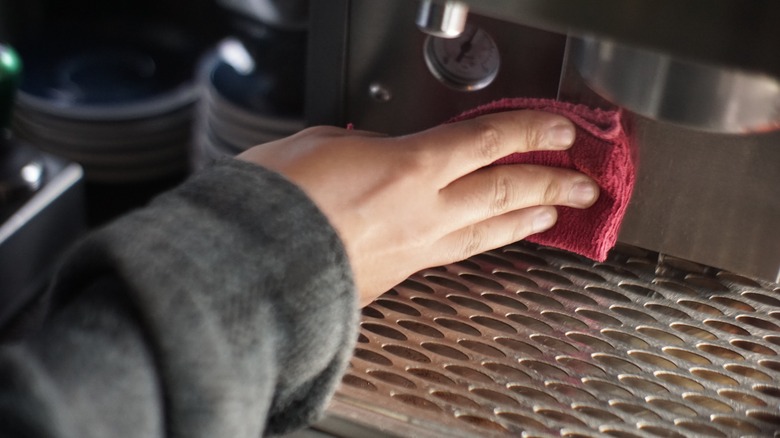The Pantry Staple That Will Keep Your Espresso Machine Sparkling Clean
We may receive a commission on purchases made from links.
Most of us have trouble functioning in the morning without some form of caffeine, which is one reason why home espresso machines have become so popular. However, these machines need to be cleaned regularly if you want them to keep functioning and your morning brew tasting its best. Fortunately, you can keep your espresso machine in tip-top shape using something almost everyone has in their pantry: vinegar!
Vinegar is a popular cleaning solution for coffee pots of all kinds, including Keurigs, because its slight acidity allows it to break down mineral buildup from water and coffee oils. This descaling process is incredibly important because deposits can start clogging your machine without it, and your espresso can begin tasting off as it picks up flavors from the gunk. Descaling with vinegar should be done at least once a year, though preferably every three to six months if you use your espresso machine often. You can also check your machine's user manual to see how frequently the manufacturer recommends descaling for your model.
To descale an espresso machine with vinegar, a solution of three parts vinegar and one part water can be used. However, you should ensure your user manual doesn't state that strong vinegar solutions could hurt your machine's components. If there is any doubt, opt for a 1:1 vinegar and water solution instead. This vinegar solution should be added to your machine's water reservoir and run through it until it is empty. Make sure to re-fill your reservoir with clean water and run it afterward to flush out any remaining vinegar.
Vinegar vs. descaling solutions: Which is the best for espresso machines?
Although vinegar is a popular for descaling, is it better than or as effective as descaling solutions designed for espresso machines? Well, it depends. Most commercial descaling solutions, including Breville espresso machine descaler and Active's descaling solution are made from partly or primarily citric acid, with some stabilizing agents or oil and calcium-removing compounds added in. While citric acid and vinegar are both acidic, vinegar is actually stronger, though it can be corrosive. These corrosive properties are one reason why it's important to check your espresso machine's user manual before using it.
While vinegar can remove buildup and mineral deposits, it can be harsher than specialized descaling solutions and can corrode some machine components, like rubber seals, over time. So, if you're using something like the Ninja Luxe Café (which you can descale with vinegar if you follow the brand's instructions), it's a good idea never to use undiluted vinegar or a vinegar solution without consulting your user manual.
Ultimately, unless stated otherwise in your machine's manual, vinegar can be just as useful as a commercial descaling solution, and it's certainly better to use than going without cleaning your machine. So long as you don't use a vinegar mixture that's too strong or concentrated, this pantry staple can be just what your espresso machine needs.

